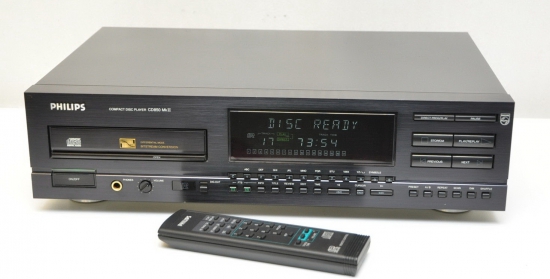Philips CD850 mkII CD-player
Only a few weeks ago, I was unlucky enough to come across a friend's six year old CD player, which apparently cost £230 new and hailed from an obscure Far Eastern plant. The machine had that early Hong Kong look about it, with electronics that displayed the same kind of 'wing and a prayer' attitude favoured by First World War fighter pilots. And the noise...two minutes was all I could take.
Shortly after this trauma, I spent an evening with £2000-worth of Deltec PDM Two. The two-box system -three if you count the transport - not only uses the latest Bit Stream chip (see panel opposite) but also takes the two-box set-up one stage further, separating the DAC and analogue stages into two different cases.
But what links these two surreal moments, aside from technology, money and time? Philips, that's what. Because while the (mis)use of one of the Dutch company's 16-bit chips made the £230 beast wail like a tom cat, the correct use of Philips DAC7 also allowed Deltec's two boxes to keep me from home for an evening.
And yet the Bit Stream statement from the company that championed CD some 10 years ago was a long time coming, and when it did come it wasted no time in going again. Many were the hi-fi editorials mourning the demise of the Philips CD840, which far from carrying the usual ridiculous price tag associated with 'statements' weighed in at a bargain £400.
Of course, there was a replacement in the wings. The CD850 cost not one penny more than its predecessor, retained high-speed digital-to-analogue conversion, and featured the same flight-deck facia. Equally predictably, it was doomed to a short life - so welcome if you will, not the CD860, but the CD850 MkII. Oh the joy of hi-fi numbers. Only on this occasion those numbers are significant.
Like me, many of you will have assumed from the start of this review that the MkII is simply a slightly souped up version of the original (witness the £160 Philips CD610 MkII, which is just a MkI with the addition of a headphone socket). And yet if you'd parted with your £400 in this belief, without auditioning, you may have suffered a shock, because, believe me, the CD850 MkII version is a new ball game altogether.
Not the least significant change is the inclusion of a Philips 7350 Bit Stream chip in place of the '7321 arrangement found in the MkI player. Not only does the MkII show how a change from one system to another can transform sound, it also proves how varying uses of the same chips can perform some equally startling musical alterations
During audition the newcomer found itself pitched against the recent memory of an CD850 MkI, plus a very real £420 Arcam Alpha (multi-bit player), a ?500 Micromega Logic (Bit Stream), and an Arcam Delta 70.3 (Bit Stream, also using Philips 7350). It didn't take long for the MkII to confirm that it really deserves an entirely new badge.
Whereas its predecessor delivered music quickly and with a tonal balance that erred on the lean and bright side, the MkII is altogether fuller and rounder. The new found balance is far from unattractive - rough recordings that were ruthlessly exposed through the Arcam 70.3 were rendered smoother and more sophisticated through the new Philips. Closely-miked female vocals took on a new intimacy, and acoustic guitar works benefitted in a similar fasion.
But although the Mkll emerged as a great buy for £400, it still imposes a strong enough musical footprint to deny it an unqualified recommendation. In particular, the lower registers were drained of some of their impact and solidity - the shortfall was almost immediately noticable on comparison with the (admittedly pricier) Arcam 70.3 and (£100 more expensive) Micromega Logic, both of which simply held on to bass transients better through the TDL loudspeakers. That said, bass lines through the MkII still perform the all-important task of playing along with the rest of the music, and it's debatable how much of the shortfall will be noticable through the systems likely to partner the £400 '850 (that is, £200 amplifiers and £150 speakers). But add the rather rounder balance to the softening of bass transients and a picture emerges of a player that may not suit those who value explosive drive and power over smoothness and subtlety. The Philips certainly robbed The Cure's Inbetween Days of some of its dirt and excitement - a commendable amount of detail was being retrieved for a £400 player, but somehow the whole was simply failing to set the speakers alight in the same way as the Micromega and Arcams. But then again not everyone wants their speakers ignited, and in that case the new '850 -with its polite rather than rabidly aggressive treble, and its integrated rather than barnstorming bass - may prove a perfect buy. With material from Seal to Prokofiev the CD850 proved consistently musical and even-balanced, exposing the aforementioned Arcams and Micromega as occasionally too rough for their own good.




